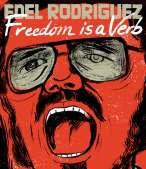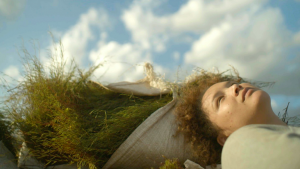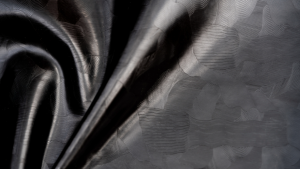Jessie Zinn is a 29-year-old filmmaker who puts her directing skills to work tackling themes of girlhood, freedom and coming of age.
A Master of Fine Arts graduate of Stanford University, Zinn has already added a few feathers to her career cap – screenings at international documentary film festivals, featuring in international publications and being selected for talent programmes. In 2017, the Capetonian was named a Marie Claire ‘future shaper’ and in 2018 she was among the Mail & Guardian’s 200 young South African ‘innovators who are helping to create an equitable future’.
Design Indaba spoke to Zinn about her favourite films of all time, trying her hand at drum majorettes, and how being exposed to theatre as a child shaped her.
You grew up in the world of theatre. How did this shape your approach to film?
Almost all my core childhood memories are etched in the world of theatre. My mom [art critic and theatre journalist Robyn Cohen] would often take me with her to shows and previews that she was reviewing, as well as various interviews she would conduct.
Some kids would do sports as their after-school activities; mine was accompanying my mother to the Baxter Theatre to watch previews of Shakespeare and Athol Fugard shows. In fact, one of my earliest memories was accompanying her to a drag show version of Aristophanes' The Birds at Kirstenbosch's amphitheatre. I think I was maybe 7 or 8 years old at the time. There was a lot of nudity and profanity … probably not the most age-appropriate activity, but hey, my childhood was nothing if not interesting!
The world of the theatre was the most wonderful place to be raised in because I was surrounded by artists and performers from a young age. I only really got into film and filmmaking much later in life, at university, but I was very much a child of the theatre and was very passionate about writing and performing from a young age.
Seeing the world through this lens, through my mom's work, exposed me to a diverse set of people from all different walks of life. I think this really sparked my interest in storytelling and, most importantly, in people's stories. At its core, my filmmaking is rooted in a love and passion for the people and stories around me, so I think that my childhood not only shaped me as a storyteller but defined me too.
Who or what are your creative inspirations?
It’s difficult to name specific filmmakers or creatives because my influences come from so many different places. I work primarily in the documentary realm, but I often take inspiration from narrative and fiction work. Boundary-pushing female directors like Andrea Arnold, Claire Denis and Lynne Ramsay are incredibly inspiring to me. I'm also inspired by directors like Paolo Sorrentino, who use highly stylised aesthetics in their work. I really enjoy playing with form and often like to incorporate stylised compositions into my non-fiction work.
I'm constantly inspired by women directors like Mati Diop who are putting out work that seeks to tell locally specific stories within an African context. And I take great inspiration from my contemporaries who are making work alongside me - incredible filmmakers whom I am lucky enough to call friends, like Aurora Brachman.
I could count on the fingers of one hand the number of female directors I had to look up to while I was growing up. Now, we're living in an incredibly exciting time, when there are lots of inspiring young women directors who are putting out game-changing work. I really am in awe of and motivated by all the women around me who are making such fantastic work.
And then, of course, my mother is my number-one hero and inspiration – she taught me the value of not only making your own stories and work, but also how important it is to lift up those around you and amplify other voices. As filmmakers, there is often this perception that we must operate as these isolated, desert islands, but there is so much value in recognising and embracing the virtues of an industry and community that is there for you to learn from and grow with.
When it comes to my actual films, the creative inspiration always comes from the subject or people I am collaborating with. I strongly feel that a creative approach needs to be organic. When it comes to documentary filmmaking, I always employ a creative ‘stylised’ approach, but that approach is never imposed on the subject. It is always drawn from within. For example, the last project I did – a short documentary titled Faces of Fortune – employed the device of stylised re-enactments on stage. This creative approach felt organic, as the subject of the film was/is a theatre performer. So ultimately, I get my creative inspiration from really listening and engaging with the people I am working with.
Tell us about your latest film, Drummies.
I first came across drummies – drum majorettes – through a beautiful photo series by South African photographer Alice Mann, which was published in The New Yorker in 2018. There was a real sense of empowerment and strength in the portraits of these young women that immediately caught my attention. I was also drawn to this subject as I was extremely dedicated to sports and dancing growing up, so I immediately felt a connection with the girls.
The team that I ended up filming with was at a school just down the road from where I grew up, so it all felt very personal and familiar. I’ll admit, the girls tried to teach me how to do a couple of their tricks, which I failed at – the hand-eye coordination required is insane!
Drummies was my thesis film in the Stanford Documentary MFA programme. While I was still in the USA, I got in touch remotely with Groote Schuur Primary School drummies coach, who was immediately excited about the project. Through WhatsApp messages and voicenotes, I ‘cast’ the main girls that the film would focus on in order to expedite the filming process a bit. Then, due to Covid-related travel restrictions, I ended up getting stuck in South Africa for the rest of the semester, which in a strange way was great because it gave me more time to spend with the girls, both on and off the screen. I became close with most of their families, who very kindly invited and welcomed me into their homes.On the ground, it was just me and my cine camera shooting the film. Even when resources aren't limited, I try to keep sets small, as it creates a more intimate and controlled environment for vérité shooting.
Through making the film, I think I learned a lot from the girls about hard work and grit — honestly, no one works as hard as these girls do when they train.
South Africa is a complex country that is still reeling from the scars of its past. Drummies offers an escape from some of the harrowing realities in our country and is intrinsically bound to dreams, hopes and aspirations. I wanted the film to reflect a dreamlike escapism, joy and fantasy perspective. Mostly, I wanted to create an empowering portrait of these incredibly inspiring young women, all of whom I have no doubt will help pave the way for a better future in our country.
What are some of your favourite films of all time?
That’s a tough one! It’s a list that is always changing. Currently, it’s C’mon C’mon [2021]directed by Mike Mills, Time [2020] directed by Garrett Bradley, Mommy [2014] directed by Xavier Dolan, Atlantics [2019] directed by Mati Diop, Cutie and the Boxer [2013] directed by Zachary Heinzerling, Fish Tank [2009]directed by Andrea Arnold and Inxeba [2017] directed by John Trengove.
What has been a career highlight for you so far?
I find all of my projects rewarding in different ways. With some films, it’s about the social impact the film has in its aftermath, for example, The Gallery That Destroys All Shame. After that film was released, lots of women messaged to say how much they loved the film and that they had found a sense of solace in hearing other women’s stories that they felt they connected with/shared. This was incredibly rewarding to hear as feedback. With other projects, like Drummies, it was an incredibly rewarding experience to make the film with all the girls — they were such a joy to work with, and the whole process was a lot of fun.
What’s up next for you in 2023? What are you working on at the moment?
A lot! On the commercial end of the spectrum, I recently signed with a new company, They Films, for representation in commercials. On the narrative front, I just wrapped my latest short documentary, Faces of Fortune, about Terry Fortune, one of the first drag queens in South Africa. Terry also happens to be someone I grew up around, so it was a really rewarding project to work on. The film was funded by the National Film & Video Foundation as well as the Department of Sport, Arts and Culture. We are waiting for its official release. I am also currently in post-production on my first documentary, The Home, and I'm in pre-production on my very first podcast.
Read more
Photographs: Jessie Zinn.







